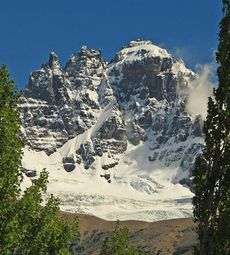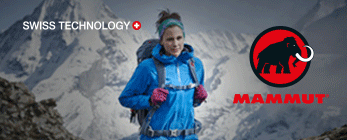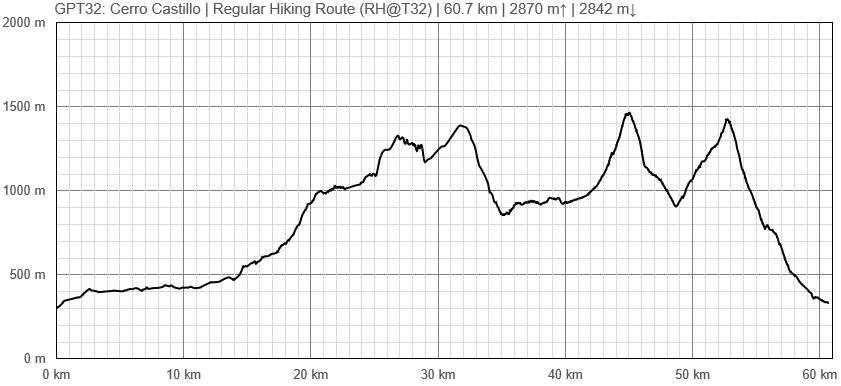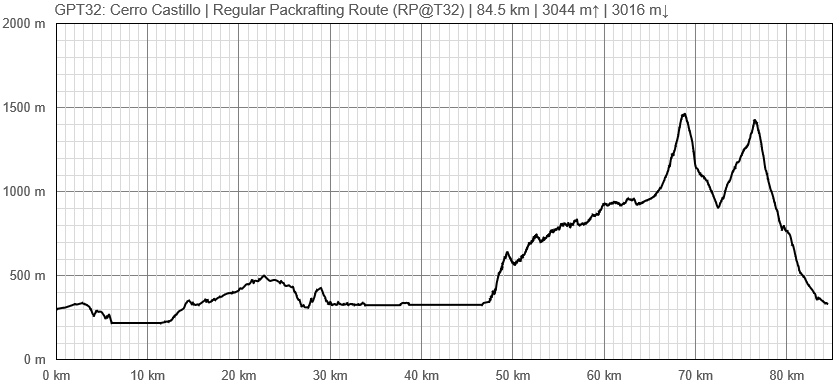Diferencia entre revisiones de «GPT32 - Cerro Castillo»
(→Recent Alerts and Suggestions) |
(→Season Section Log) (Etiquetas: Edición desde móvil, Edición vía web móvil) |
||
| Línea 59: | Línea 59: | ||
==Season Section Log== | ==Season Section Log== | ||
| + | *2020-March-6 / Ty & America / 4.5 Days SOBO RR. Start @ El Blanco | ||
| + | |||
| + | We started in El Blanco, opting to hike by Lago Montreal, which was pretty nice. No traffic though, so if you’re wanting a hitch the regular start in Villa freí may be a better option. Settlers in Lago Montreal are super friendly. There’s a bit of water there as you pass by the lake. We camped there. I recommend going further to the marked camp though because the next day is a big challenge. RH-CC-A@32-25.2+7.9 Is the Cruz of the section. After this all good. I do not recommend doing this unless you’re very comfortable on your feet and have a lightweight pack. | ||
| + | |||
| + | -stick to the treeline/marked path on this. The traversing is tough, but completely doable. 2-3 km in is the gully with the very difficult climb. Keep the the grassy patch, getting to the base of it was the most dangerous part for us. Very slippery rock. I had America drop her pack. High risk, but I was MUCH more comfortable. | ||
| + | |||
| + | -about a k after is the second dangerous area. This is a straight rock wall that spans all the way up& down the mountain. The only way through is to climb around. I checked below it and didn’t find a way through the trees. I took both Sanita & America’s packs through this section; as again, it’s very high risk..with an actual climbing move involved. Again, it’s important you’re very comfortable with your pack to get through these parts. | ||
| + | |||
| + | After these dangerous sections we were wiped out and camped in the valley before the pass. Lots of places to camp with good water. Be aware of slight rockfall risk. There’s an amazing place to camp with ideal conditions at the top of the pass. | ||
| + | |||
| + | Going on, all smooth, both marked camps on the way up the second pass are actually closed...there’s an open camp right between the two. | ||
| + | |||
| + | Amazing places to camp up by Laguna Castillo. | ||
| + | |||
| + | We snuck around the riverbed once we saw the blue tent at the bottom (where you might have to pay) and got by with no problems. | ||
| + | |||
* 2019-Nov-29/ Lea Geibel, Kevin Moe/ 3 | * 2019-Nov-29/ Lea Geibel, Kevin Moe/ 3 | ||
Revisión del 15:59 7 mar 2020
| All GPT sections (click to show) |
|---|
|
GPT Section Articles
|
Recent Alerts and Suggestions
- 2019 Jan/ OIlrik / Northbound
We ended up doing the normal Cerro Castillo hike as the weather was forecasting heavy rain and snow so we did not want to be on the pass. The regular trail is just gorgeous and the park is beautiful. The trail in the north is not on the new CONAF maps but is marked on the old ones.
- Jan 2020 / RH Northbound / Matthieu
No technical difficulties in the park, just following the trail and enjoying the views.
To follow the GPT northbound, leave the parc trail to go north. It is an "old sendero" in the forest, but well maintained and easy to follow during the beginning (it is marked on maps of the parc). In this direction, no problem to leave the forest in a safe spot, but southbound, looking behind, seemed hard to find the entrance of the forest and of the safe trail ! No technical difficulties until the first pass, rocky terrain like the rest of the park.
The dangerous part is indeed between the 2 passes. You dont go in the valley in front of you but follow the altitude line until the pass that you see at the right side of the valley. Very steepy rolling stones path. I was a little bit afraid. I tried to be smarter than the tracks, trying more uphill... this was a dangerous mistake that took me long to repair and go back to the tracks. There are indeed two river crossing (no dangerous waterstream) but they are circled by cliffs, so not easily crossable. The track follow mostly the tree line (I.e the separations between the little trees and the stones) So my recommendations : - follow the gps tracks : they follow the tree line who is safer with a solid ground and grass. Sometimes you have to cross the stones, no choice, so go slowly, choose your paces wisely and it's doable. Try to aim for the grounds of grass in the middle, which are solid, or the stones with foam on them, which mostly didn't move for a while. For the rivercrossing, it aims a good spot with no need to climb down or up. - choose a good weather day : for me it was sunny and no wind, so perfect day, and it was already mentally hard (not speaking of the horseflies getting you crazy during the hard moments !). I wouldn't try it with rain or big wind in this river of rolling stones. - if you don't feel it, easy escape by the normal trail of the parc
However, I can assure that the prize for the effort, going northbound, is amazing !! But I won't spoil ! After the second pass, no technical difficulties, you find a Conaf trail easily, and I even cross some tourists with a guide.
- 2020-Jan-18 and 19 / Regular Hiking Southbound / Martin Lizondo
The starting minor road gets into the private propiety of Pedro Sangüesa (+56 9 9099 9083) at 45º 52' 15,55" S, 72º 2' 46,28" O. He didn’t like people to pass through and denied that there was a trail, but it turned out to be a Conaf’s well signed area. He said in the future he will ask for money, but finally left me pass for no charge. I met other day hikers going to « El Mirador ». Snow was easy at the passes. The trail was in good conditions until the cross country. There are two spots which I consider dangerous, so I don’t recomend doing this section alone: 1) the gps tracks passes through a very vertical rocky (nearly climbing). I was scared and I can’t recommend doing it, except you asume this risk. I could see later in a map that the original route went all way down in the valley through lenga forest, but if there was a trail it’s invisible now. 2) When the cross country leaves the tree line and becomes a small trail into the lenga forest at 45º 58' 23,54" S, 72º 6' 10,02" O (“minor road” starts later, despite the gps track info); it’s very stepy and unmaintained. I made a mistake and started to follow the stream all way down, but you have to look up and search the beginning of the hidden path. It’s very vertical and easy to fell down, because of recent land slides. Be extremely carefull. The rest of Cerro Castillo from Las Horquetas is well maintained, beautifull and enjoyable. Cons: Lots of people. When leaving at the Nezoelandes entrance, you’ll have to pass near to the payment cabin. I didn’ t have to pay, but it was because I spent only a short time in the park. The cost for foreigners is normaly CLP 29,000.
- 2019-Nov-29 / Lea Geibel, Kevin Moe
Snow line is at around 1200 Meters but all passes are safely traversable. The National Park Entrance Fee got raised to 29000 CLP per person for overnight hikes in season 19/20. The park generally seemed very poorly organized, we were told the passes are "closed" at first, whereas they were easy and safe to traverse. The ranger insisted that we could not hike the normal route northbound but have to sign out of the park at the Las Horquetas checkpoint. In high season, the ranger station in the park is manned, so maybe it is possible so sign out there and head northbound.
- 2019-Nov-12 / Eva Havlová
There is still lots of snow in the National Park. I arrived to Villa Cerro Castillo 3 days ago (Novembre 12, 2019) and planed to hike nortbound but rangers didn't let me go. I saw the pass they were talking about (avalanche risk) and I don't think any avalanche could occure, but the thuth is that there is lots of water runing down and the trail is like a stream. They said it might be possible to do it next week.
Season Section Log
- 2020-March-6 / Ty & America / 4.5 Days SOBO RR. Start @ El Blanco
We started in El Blanco, opting to hike by Lago Montreal, which was pretty nice. No traffic though, so if you’re wanting a hitch the regular start in Villa freí may be a better option. Settlers in Lago Montreal are super friendly. There’s a bit of water there as you pass by the lake. We camped there. I recommend going further to the marked camp though because the next day is a big challenge. RH-CC-A@32-25.2+7.9 Is the Cruz of the section. After this all good. I do not recommend doing this unless you’re very comfortable on your feet and have a lightweight pack.
-stick to the treeline/marked path on this. The traversing is tough, but completely doable. 2-3 km in is the gully with the very difficult climb. Keep the the grassy patch, getting to the base of it was the most dangerous part for us. Very slippery rock. I had America drop her pack. High risk, but I was MUCH more comfortable.
-about a k after is the second dangerous area. This is a straight rock wall that spans all the way up& down the mountain. The only way through is to climb around. I checked below it and didn’t find a way through the trees. I took both Sanita & America’s packs through this section; as again, it’s very high risk..with an actual climbing move involved. Again, it’s important you’re very comfortable with your pack to get through these parts.
After these dangerous sections we were wiped out and camped in the valley before the pass. Lots of places to camp with good water. Be aware of slight rockfall risk. There’s an amazing place to camp with ideal conditions at the top of the pass.
Going on, all smooth, both marked camps on the way up the second pass are actually closed...there’s an open camp right between the two.
Amazing places to camp up by Laguna Castillo.
We snuck around the riverbed once we saw the blue tent at the bottom (where you might have to pay) and got by with no problems.
- 2019-Nov-29/ Lea Geibel, Kevin Moe/ 3
days / Northbound / Regular Hiking Route with OH-MR-V (Villa Cerro Castillo to Las Horquetas)/ The section follows the rather popular tourist Hiking route Las Horquetas for the first two days, meaning there will be less solitude but also rather well maintained trails. The national park and the region around Cerro Castillo was very impressive, we especially enjoyed to take all the side trails and visit the numerous beautiful glacier lagoons. The only unpleasant part of the hike was the organization of the national park. The exorbitant high entrance fees are in no relation to the other parks, which is due to a high ratio of private land in the area but makes the park rather unattractive for tourists. some rangers seemed poorly informed and couldn't give much information (e.g. insisted that passes were "closed" and only after asking numerous times agreed to check with his colleagues that told that they are "open"). They also said it is not possible to hike the regular route of the GPT, because we have to check out of the NP at the checkpoint Las Horquetas. There is an optional hiking route continuing North from there. Due to bad weather coming up we ended up not finishing the northern stretch of the trail and just followed the entire Las Horquetas Route at the Carretera Austral.
Jan 2020
GPT32 South 7days
_____________________ Coyhaique to Villa Freí: There is a bus from the bus terminal in Coyhaique to Villa Freí. From there it was a hot dusty road.
_____________________ Accessing the park : You have to pass through 4 private properties to enter the first sector of the park. We met some people. Had short friendly chats, but no problems with access. Just before you enter the park (where there are two trail options) there is easy access to the river via a cow trail. However water in general was no issue and I didn't carry water for the entire 7 days through the park.
The camp site used to be an official campsite before the sector was closed due to access problems. The dunny is in great shape.
_____________________ Through the first sector : The trail is in great shape until after the mirador. You then cut upwards into the alpine which is also easy walking. After passing through a saddle, you contour around above the treeline. This is the most difficult part of the section. Quite a bit of step scree traversing. Not for everyone. Once you drop into the valley waking is again easier. There are some occasional cairns that become more and more frequent as you drop into the other valley. As you contour left an intermittent trail is evident. When you enter the lenga forest (-45.97321, -72.10278) there is a great trail down that turns into a road here : (-45.97886, -72.10358) (Jan: maybe you want to update the track files to reflect this?) Then is road walking to join the popular walk.
_____________________ Popular sector of Cerró Castillo : There are some side trips not included in the track files. They're on the map you get. Note that the old Bosque site (-46.06197, -72.16016) and La Tetera (-46.07200, -72.18390) are now closed. You can not camp there. For most people this means camping at the new el Bosque : (-46.06418, -72.16964)(Jan : maybe you want to update the track files?) Get to Laguna Cerró Castillo before 12 to beat the walkers heading up for the day. But this shouldn't be an issue as you need to cross the pass early : an important thing we would have liked to know is that the pass (-46.08030, -72.21103) can be closed in the afternoon due to strong winds. There is literally a ranger there that can turn people around. Not much water over the pass either. And the poza cerca mirador doesn't look welcoming. Carry water here. In the next valley there were more rangers and we saw some people get checked for permits. It's a shame this park is now being comercialalised :(
_____________________ Getting back to Coyhaique : Not much traffic. The last bus heads back at 6pm
_____________________ I'll try upload some map photos and a breakdown of the entrance fees when I get the photos off my camera.
Cheers, Felix.
Summary Table
| GPT32: Cerro Castillo | Hiking | Packrafting | |||||
| Group | H: Aysen Sur | Total | 67.0 km | 23 h | 90.8 km | 30 h | |
| Region | Chile: Aysén (XI) | Trails (TL) | 22.2 km | 33.1% | 20.9 km | 23.0% | |
| Start | Villa Frei | Minor Roads (MR) | 35.6 km | 53.1% | 47.5 km | 52.3% | |
| Finish | Villa Cerro Castillo | Primary Roads (PR) | - | - | - | - | |
| Status | Published & Verified | Cross-Country (CC) | 9.2 km | 13.8% | 3.8 km | 4.2% | |
| Traversable | Dec - Mar (Maybe: Nov, Apr) | Bush-Bashing (BB) | - | - | 1.2 km | 1.3% | |
| Packraft | Very Useful | Ferry (FY) | - | - | - | - | |
| Connects to | GPT31H, GPT31P, GPT33H, GPT33P | Investigation (I) | - | - | - | - | |
| Options | 199 km (8 Options & Variants) | Exploration (EXP) | - | - | - | - | |
| Hiking | Packrafting | Total on Water | 17.5 km | 19.2% | |||
| Attraction | 4 (of 5) | 4 (of 5) | River (RI) | - | - | ||
| Difficulty | 4 (of 5) | 4 (of 5) | Lake (LK) | 17.5 km | 19.2% | ||
| Direction | Both ↓↑ | Both ↓↑ | Fjord (FJ) | - | - | ||
| Comment | - | ||||||
| Character | Valdivian Rain Forest, Alpine Terrain, Farmland, Settlers, Lake Packrafting | ||||||
| Challenges | Exposure to Elements, Clambering, Bush Bashing, Demanding Navigation | ||||||
Satellite Image Map
Elevation Profile
Elevation Profile of Regular Hiking Route
Elevation Profile of Regular Packrafting Route
Section Planning Status
Recommended Travel Period
Benefits of Hiking and Packrafting
Recommended Travel Direction
Section Length and Travel Duration
Suitable Section Combinations
Section Attractiveness
Section Difficulty
Resupply
Resupply Town
Town: Villa Cerro Castillo. Villa Cerro Castillo has several restaurants, small markets, and plenty of lodging options, including a popular backpacker camping destination on the east side of town.
Shopping: Food
Shopping: Fuel
Shopping: Equipment
Services: Restaurants
Services: Laundry
Services: ATM and Money Exchange
Accommodation: Hostals and Hotels
Accommodation: Cabañas
Accommodation: Camping
Transport: Ground Transport
Transport: Ferries
Transport: Shipping Services
Resupply on the Trail
Location, Names, Available Items and Services
Access to Route and Return
Access to Start
Return from Finish
Escape Options
Permits, Entry Fees and Right-of-Way Issues
Regular Route
Regular Hiking Route
Regular Packrafting Route
- Route description by Kara Davis after Season 2017/18:
A sandy beach with a visible structure in the grass is the take-out for Lago Elizalde. After exiting, make your way through the farmland until encountering a gravel road that leads past the house at the top of the hill up to Ruta X-686.
Ruta X-686 is a lightly trafficked but well-formed gravel road that is fenced on either side. After crossing the Río Paloma, Ruta X-686 makes a sharp left and begins to climb. 4 km after the sharp left turn, cross a bridge to the left and climb to a wooden gate. If you descend the steep slope to the left of the gate, there is camping under some trees.
The wooden gate marks the beginning of a very long driveway to a house located near the lake. The route takes you along this driveway until a river crossing. After crossing the river, walk northeast along its shore towards the Río Paloma. After reaching the end of the fenceline near the Río Paloma, turn east and walk along the fenceline until reaching Lago Desierto. At the river outlet, there is a nice beach to put in to Lago Desierto.
There is no camping along the shores of Lago Desierto. The take-out is a rocky beach at the base of a bluff. Walk up the bluff and cross country through the farmland to Lago Azul. At the east end of the farm, descend down a road to a rocky beach at the Lago Azul shoreline with a metal structure.
There are a couple of potential camping options along the shoreline of Lago Azul. There are also several residences on the north shore. The take-out is a long rocky beach set before a well manicured forest. On the east end of the land near Lago La Paloma is an expensive looking house surrounded by several other buildings.
There is a 4WD track to the west of the smaller red house located south of the big residence. Ascend the steep climb on a well-formed road that is criss-crossed with several smaller tracks labeled in english with wooden signs. Due to the steep slopes on either side of the cut out road, there is no camping here.
Eventually, the route turns off of the road onto an overgrown 4WD track. Camping off the track is still difficult because of prickly vegetation and steep terrain. This track ends 2.5 km from where the Regular Packrafting Route joins the Regular Hiking Route. From here, the route involves some bushwhacking and following a small trail as it winds in and out of existence. Just before joining with the Regular Hiking Route, the route widens into an old 4WD track that passes some destroyed structures.
The routes join up at a large rock cairn and continues to follow a 4WD track until reaching a large wooden sign with a map of the Reserva Nacional Cerro Castillo. Here there is also a campsite and ranger station. There is a 5.000 CLP fee to enter the reserve.
The route from here is a popular track for backpackers with designated campsites. The trail is well-formed and winds through the forest. When the trail becomes less obvious, the way is shown with yellow markers. In this area there is a designated campsite with a latrine.
At treeline, follow the cairns and rocks painted with white and red stripes through the scree up and over the first pass (approximate elevation 1.450 m). After the steep descent, reenter the trees. There is a campsite, Camping El Bosque, soon after reaching treeline (approximately elevation 940 m) with water and a latrine.
The trail begins to wind up through the forest toward Laguna Castillo. The sights from Laguna Castillo, which is at the base of the pass, are stunning. There are two tracks that climb up to the pass. Make sure to take the path that climbs to the south instead of continuing southeast over the obvious saddle.
The track down to Ruta X-720 is well formed, marked, and popular, but occasionally braided. Follow it until reaching the wooden stile with a rangers hut. From there join Ruta X-720, a dirt road which leads to Highway 7 and Villa Cerro Castillo.








